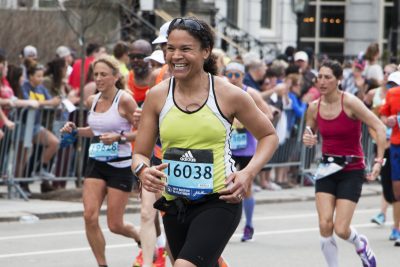
As a Massachusetts resident, I grew up loving Patriots Day because of one reason: it meant it was time for the Boston Marathon.
Sports came second to none in my household growing up, and as a three season athlete, the Marathon was always an exciting event to watch and celebrate. I never had any dreams to run it, but driving down at 5 a.m. on Monday morning to park outside Boston and take the commuter rail in with my parents was something I looked forward to every year.
The energy around the Boston Marathon is the best part of the day. Watching the families, friends and locals who come out to see the runners, cheering and dancing around the streets with policemen, concocts a feeling like no other: one of pure joy and enthusiasm.
The Tuesday after the marathon, my father and I would always go outside to get our local paper and read the profiles written about that year’s runners. It was always so inspiring to read the stories of war veterans, terminal cancer survivors and travelers from countries far away who all chose to come to my city of Boston to run. But after the 2013 Boston Marathon bombings occurred, the Marathon came to take a whole new meaning, especially for those of us who couldn’t just leave this place when the race was over.
With such a deep history of runners and their stories, it seems trivial to talk about what the Marathon means to myself as a Massachusetts resident. Instead, I’d like to share the stories of people who are much braver and inspirational than me, and who have impacted this city more than I ever could just by partaking in this wonderful race.
1) Kathrine Switzer
The story of Kathrine Switzer is perhaps one of the all-time classic Boston Marathon stories. The year was 1967, and Switzer was an avid runner. She became the first woman to run the Boston Marathon, pretending to be a man in order to participate. In an effort to prove wrong everyone who told her she couldn’t do it, Switzer registered for the marathon, and even though several men tried to literally drag her out from the race, taunted her and tripped her, she made it all the way to the end and completely changed history. Kathrine created a legacy for herself and made a precedent for all other female runners — you can do it, too.
2) Rosie Rulz
Even though I’d like to mention primarily positive Boston Marathon runners, it’d be unfair to not include the famous Rosie Rulz scandal in this column. This is another famous one, but for almost the complete opposite reasons of Switzer’s race. Amateur runner Rosie Ruiz was declared the female marathon winner in the 1980 Boston Marathon, much to the surprise of the running world (and the runners who had claimed they hadn’t seen Ruiz during the race alongside them at all). After some minor investigations, however, it was concluded that Rosie actually didn’t win the race, rather she had cheated the competition.
3) Bennett Beach
Bennett Beach has ran in the Boston Marathon every year for the past 50 years, giving him the longest record for consecutive runs in the Boston Marathon by a single person. As a 68-year-old man, Bennett Beach also lives with a neurological movement disorder, making him an icon for not only elderly runners, but disabled runners as well. He runs with a severe limp, but has still managed to complete the race for 50 years, a truly remarkable accomplishment.
4) Rebekah Gregory
Rebekah Gregory was one of the unfortunate affected by the Boston Marathon bombings in 2013. After 17 surgeries, Gregory opted to have her leg amputated, and since then has taken on prosthetic limbs and continued to run. In 2015, Gregory ran the final steps of the race with her trainer beside her, and was truly embraced by the city of Boston as she crossed the finish line with excruciating pain and a twisted knee above her prosthetic leg. Gregory’s choice to continue running in the race, even after the bombings, is why I included her. She truly represented the resilience of the city of Boston when she crossed that line.
5) Dick and Rick Hoyt
Although this famous father-son duo no longer participates in the marathon, the two ran the marathon over 30 times together. Rick, who has cerebral palsy, and his father, Dick, could be found racing down the streets of Boston together with Dick pushing Rick in his chair. Both of the Hoyts have a special interest and love for sports, so they began competing in marathons and triathlons together as a way to experience the sort of athleticism that Rick always craved growing up. While we certainly miss seeing them in the marathon, the image of the duo will be a long lasting one and an eternal inspiration to other runners around the world.










